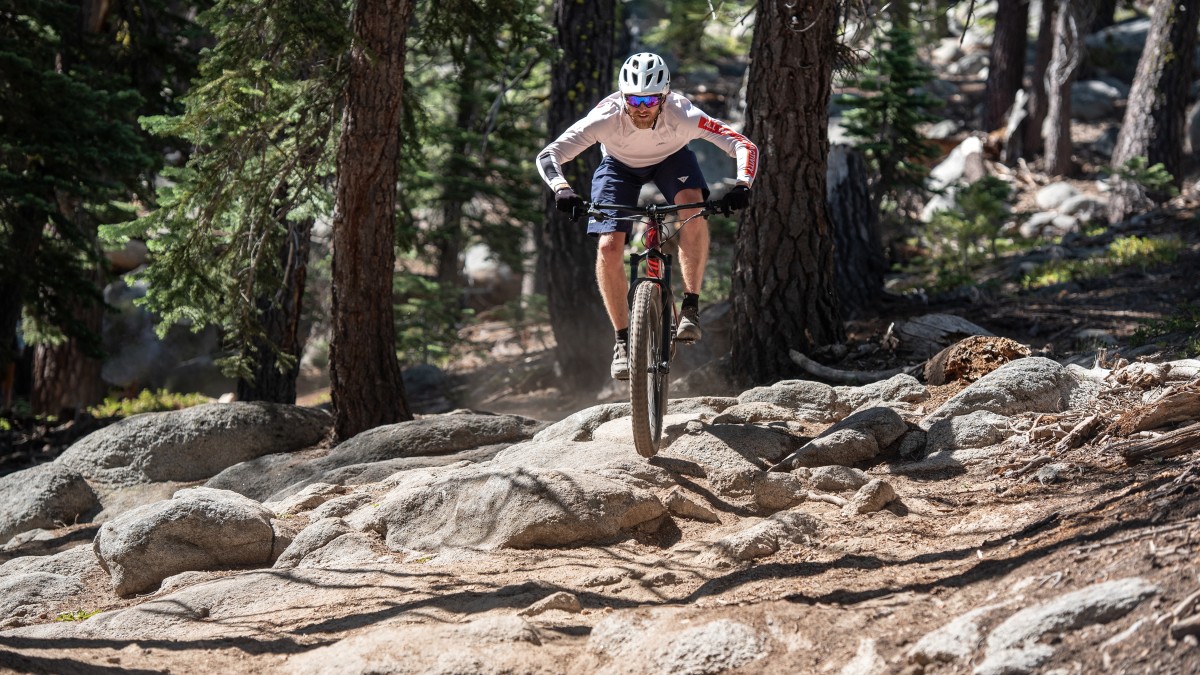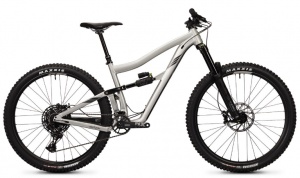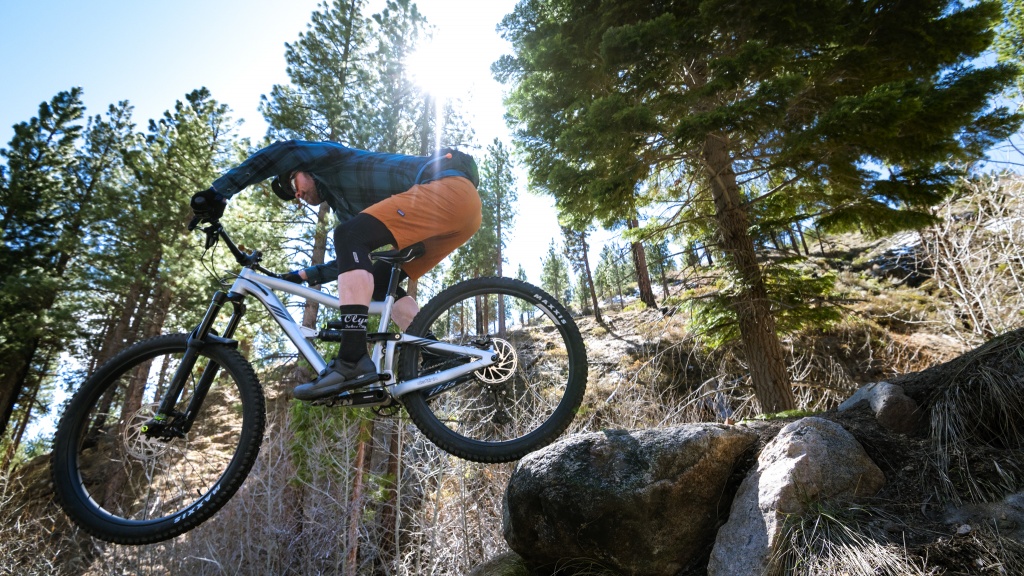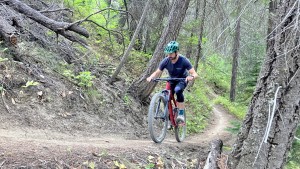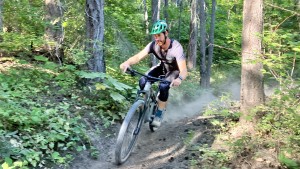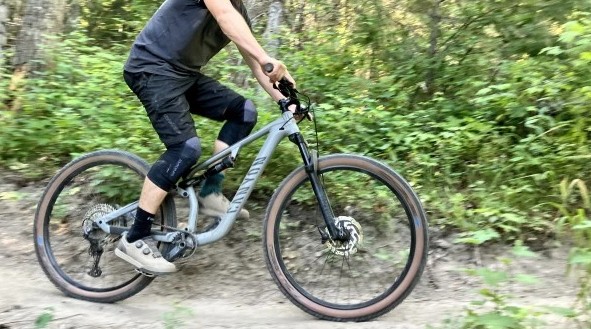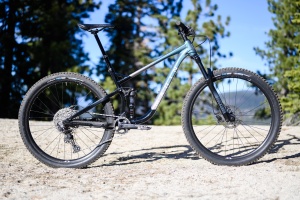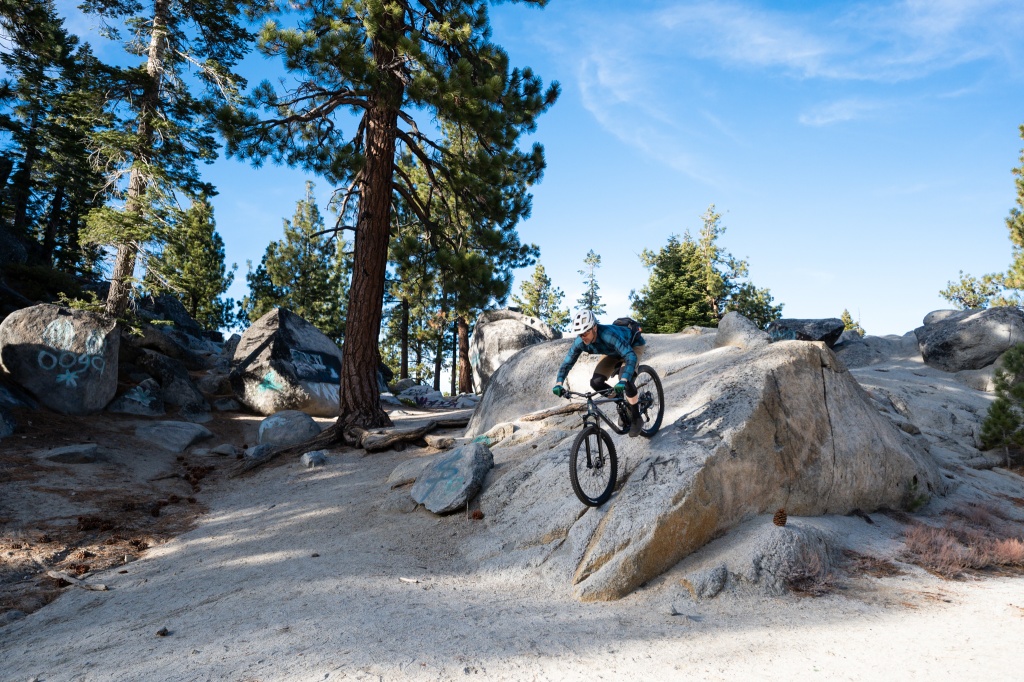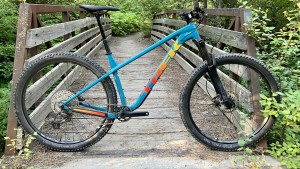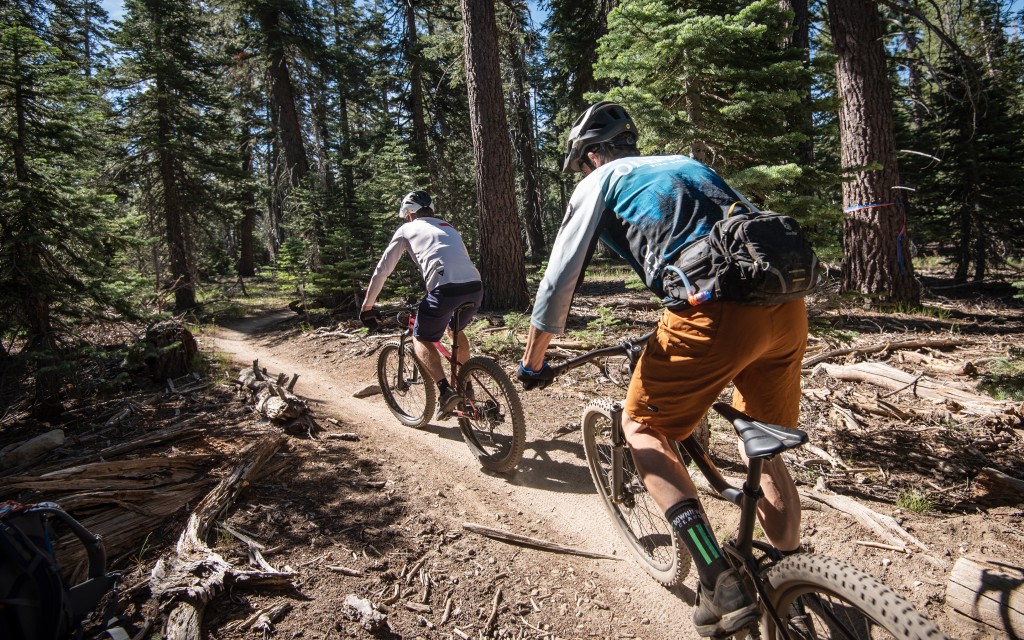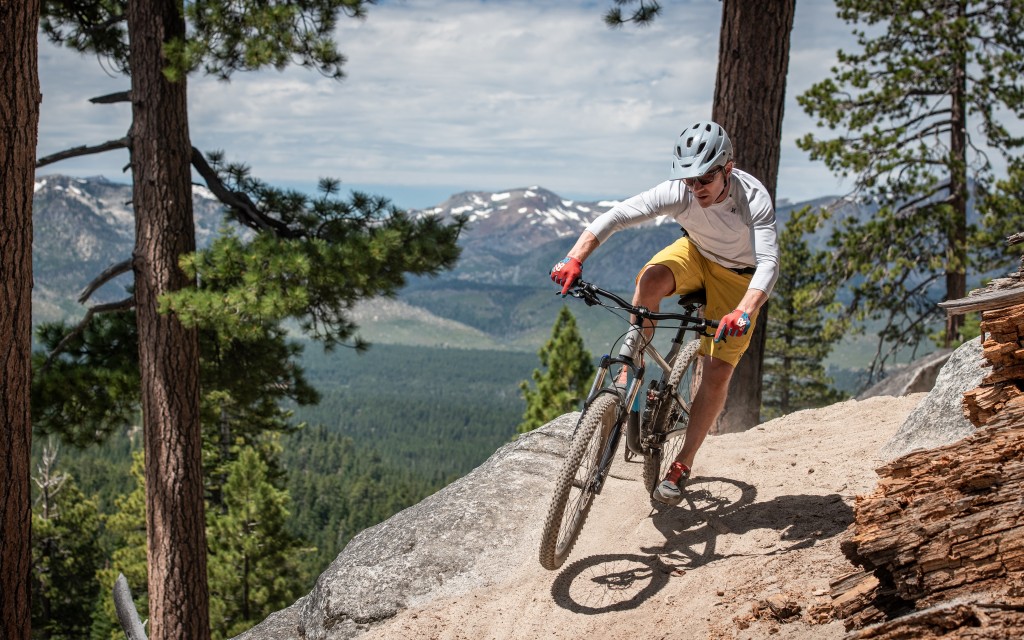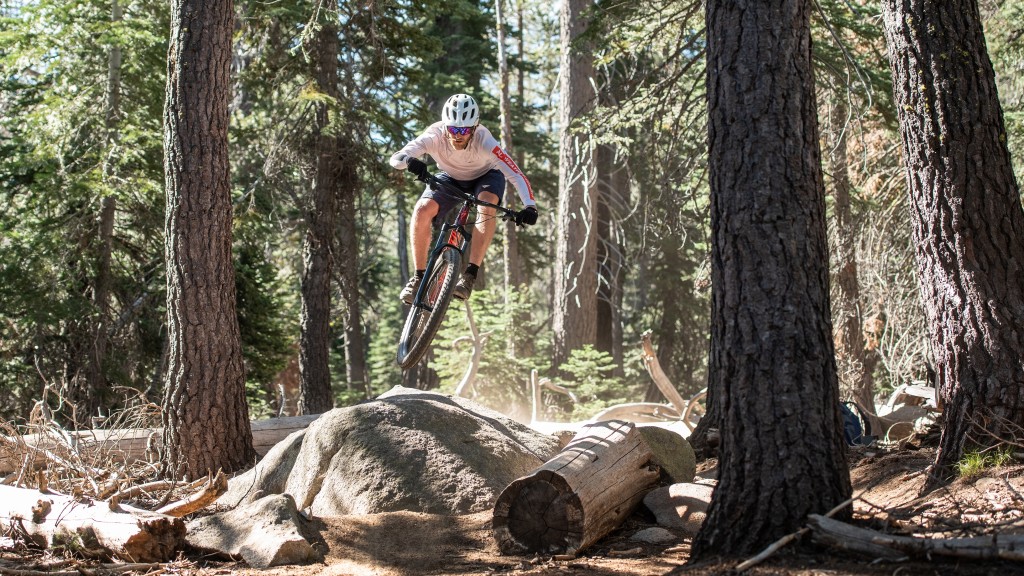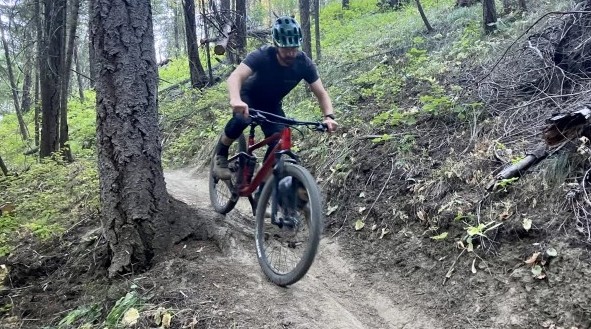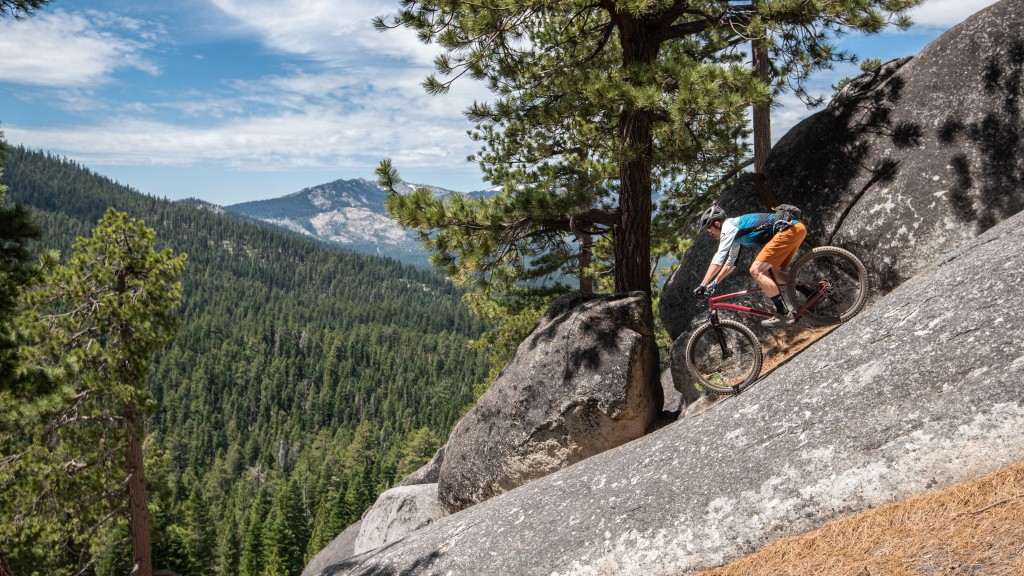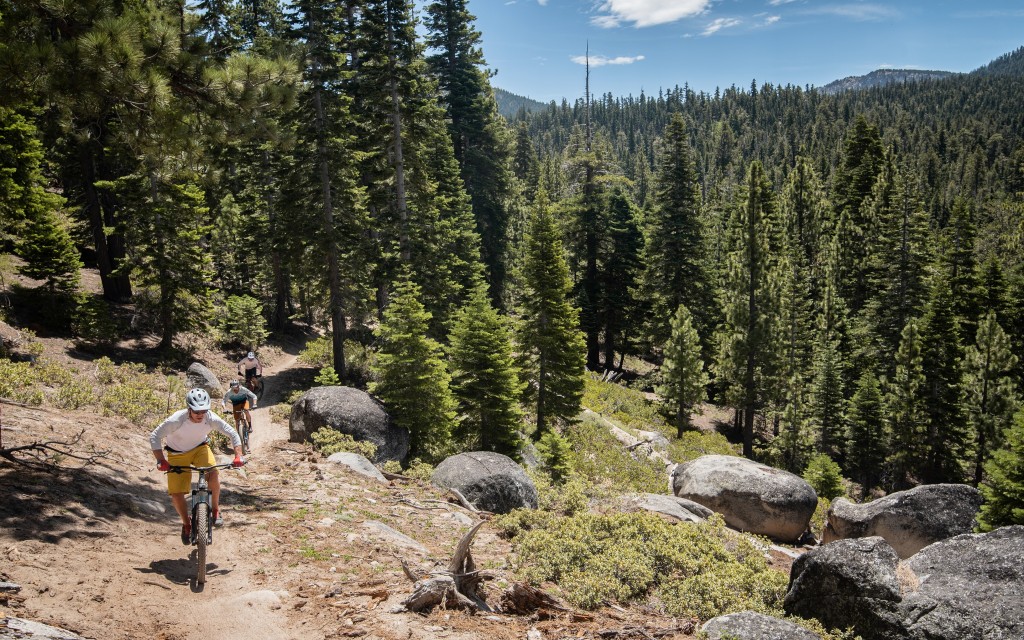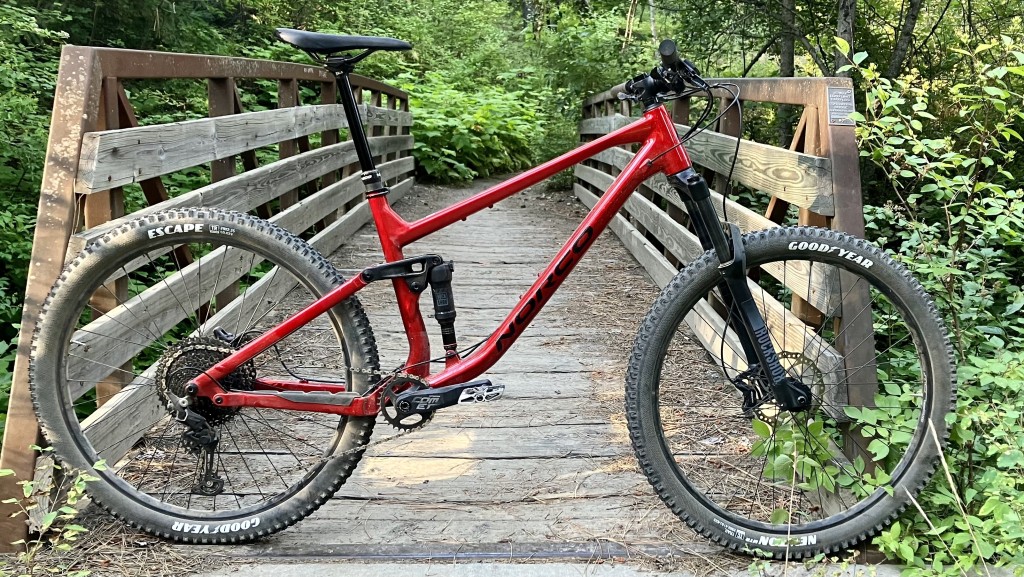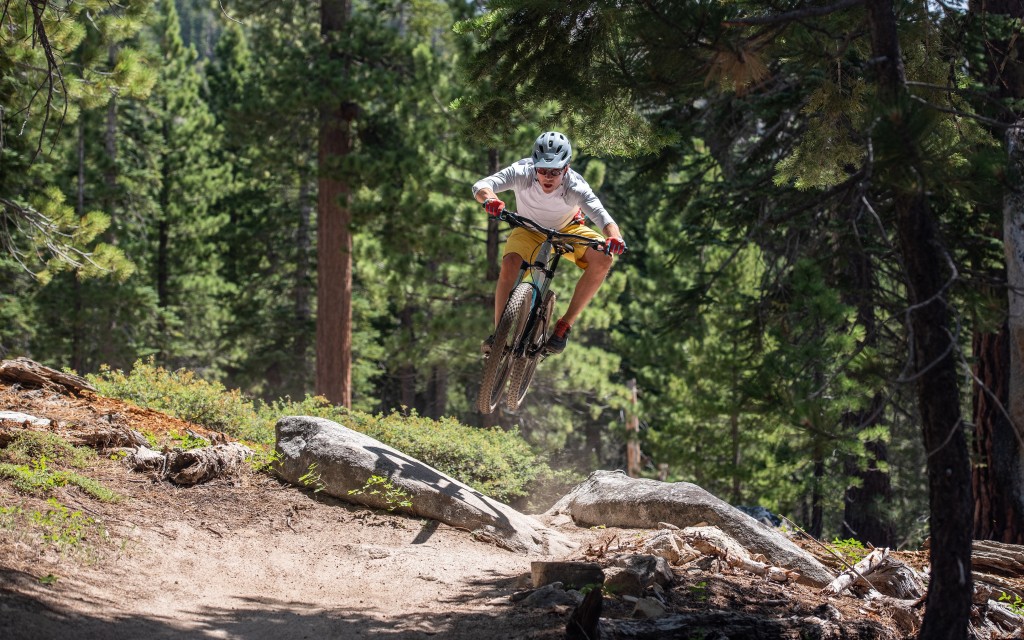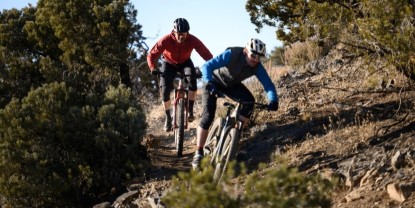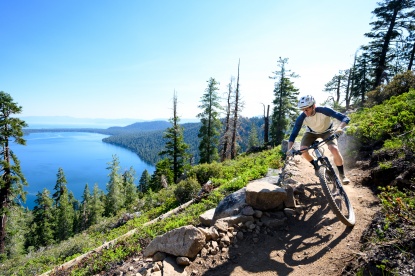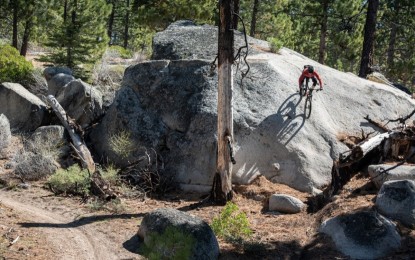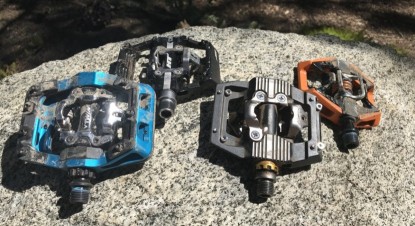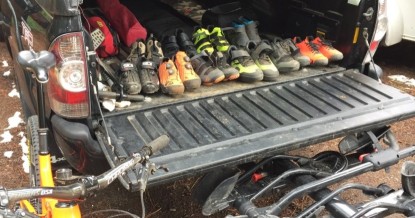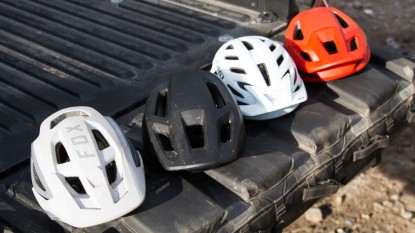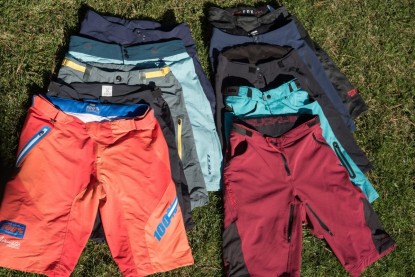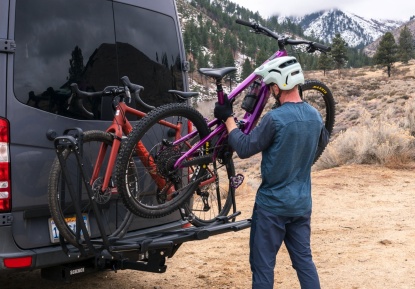The 5 Best Budget Mountain Bikes of 2024
When you're ready for an upgrade, take a look at our best mountain bike recommendations. In addition to the top bikes, we have crafted many reviews for all types of bike gear, too. From the best mountain bike tires to our favorite MTB shorts and the most protective and best mountain bike helmets, our professional mountain bike testers can help you find what you need.
| Awards | |||||
|---|---|---|---|---|---|
| Price | $2,999 List | $1,899 List | $2,399 List | $1,799 List | $2,700 List |
Overall Score  |
|||||
| Star Rating | |||||
| Pros | Spectacular handling, Robust suspension, Excellent value | Extremely capable on the descents, comfortable climbing abilities, solid build spec | Awesome build for the price, versatile, well-rounded performance | Excellent uphill efficiency, agile and responsive, fun on mellow to moderate terrain | Supple rear suspension, versatile, fun on a wide range of terrain, affordable |
| Cons | Heavy AF model, Too much bike for some terrain | Long wheelbase might not be ideal for some trail networks, not a particularly spritely climber | Firm grips, saddle shape | Stock tires can be easily overwhelmed, not great on rough trails | moderately heavy, short dropper post, frame sizing runs a little small |
| Bottom Line | A bold, aggressive trail ripper with an awesome price tag | A confident and capable bike at an outstanding price, this is a fantastic bike! | A well-rounded mid-travel trail bike with a great build at an amazing price | An efficient and agile trail bike that flies uphill | An affordable mid-travel trail bike with a good all-around performance and a preference for the descents |
| Rating Categories | Ibis Ripmo AF NX Eagle | Norco Fluid FS 4 | Polygon Siskiu T8 | Canyon Neuron 5 | Trek Fuel EX 5 |
| Fun Factor (30%) | |||||
| Downhill (30%) | |||||
| Climbing (25%) | |||||
| Build (15%) | |||||
| Specs | Ibis Ripmo AF NX Eagle | Norco Fluid FS 4 | Polygon Siskiu T8 | Canyon Neuron 5 | Trek Fuel EX 5 |
| Wheelsize | 29" | 29" | 29" | 29" | 29" |
| Weight | 34 lbs (Large) | 36 lbs 2 oz (tubeless) | 32 lbs 8 oz | 33 lbs 10 oz (tubeless) | 33 lbs 7 oz |
| Frame Material | Aluminum | Aluminum | Aluminum | Aluminum | Aluminum |
| Size Tested | L | XL | L | L | L |
| Available Sizes | S, M, L, XL | S-XXL | S, M, L, XL | XS-XL | XS, S, M, L, XL, XXL |
| Fork | DVO Diamond D1 160mm | RockShox Recon RL, 140mm | Fox Rhythm 34, 140mm | RockShox Recon Silver RL, 130mm | RockShox Recon RL Solo Air, 140mm |
| Rear Shock | DVO Topaz T3 Air | X-Fusion 02 Pro R, 120mm | Fox Float DPS Performance EVOL | RockShox Deluxe Select | RockShox Deluxe Select+ |
| Wheelset | Ibis S35 Aluminum rims with Ibis hubs, 35mm ID | Stan's Flow D Rims with Bear Pawls hub | Entity XL2 Disc | Iridium 30 | Formula front hub, Bontrager rear hub, Alex MD35 rims |
| Front Tire | Maxxis Assegai EXO+ 2.5" | Goodyear Newton 29 x 2.4" Folding | Schwalbe Han Dampf Addix Speedgrip EVO TLE 2.6" | Schwalbe Nobby Nic 29 x 2.4" | Bontrager XR4 Team Issue 2.6" |
| Rear Tire | Maxxis Assegai EXO+ 2.5" | Goodyear Escape 29 x 2.35" Folding | Schwalbe Han Dampf Addix Speedgrip EVO TLE 2.6" | Schwalbe Wicked WIll 29 x 2.4" | Bontrager XR4 Team Issue 2.6" |
| Shifters | SRAM NX 12-speed | Shimano Deore 11- Speed | Shimano SLX 12-speed | Shimano Deore 12-speed | Shimano Deore 10-speed |
| Rear Derailleur | SRAM NX 12-speed | Shimano Deore 11-speed | Shimano SLX 12-speed | Shimano Deore 12-speed | Shimano Deore 10-speed |
| Cranks | SRAM NX Eagle DUB | FSA Comet | Shimano MT510 175mm(L-XL) | Praxis | Race Face Ride 175mm |
| Chainring | 32T | 30T | 32T | 32T | 30T |
| Bottom Bracket | SRAM DUB BSA | FSA Mega EXO | BSA Threaded | Shimano | Shimano PressFit |
| Cassette | SRAM GX Eagel 10-52T | Sunrace 11-speed 11-51T | Shimano SLX 12-speed 10-51T | Shimano Deore 12-speed 10-51T | SunRace 10-speed 11-42T |
| Saddle | WTB Silverado Pro | Norco Trail | Entity XTENT | Selle Italia X3 | Bontrager Arvada |
| Seatpost | KS Rage-i 150mm(Large) | SDG Tellis Dropper 200mm | Tranz-X 170mm (L-XL) | Iridium Dropper 150mm | TranzX YSP18 Internal 130mm |
| Handlebar | Ibis alloy 780mm | E*Thirteen 800mm | Entity Expert 780mm | Iridium Flat. 780mm | Bontrager alloy 750mm |
| Stem | Alloy 40mm | Entity Expert 35mm | Iridium, 50mm | Bontrager Rhythm Comp, 50mm | |
| Brakes | SRAM Guide T 4 piston | Tektro HD-M535 | Tektro HD-M745 4-piston | Shimano BT-MT10 | Shimano MT200 |
| Warranty | 7 Years on frame | Five years | 10 Years on frame | Six Years | Lifetime limited warranty on frame |
Best Value Heavy-Duty Trail Bike
Ibis Ripmo AF NX Eagle
The Ibis Ripmo AF is the best value on a burly full-suspension trail bike and comes with our highest recommendation. This bike's geometry is the epitome of an aggressive trail, and it still manages to climb like a goat. The carbon version of this bike is our current editor's choice trail bike and has won our accolades for so many reasons. This bike has the same aggressive/progressive geometry and very similar ride quality for a couple of thousand dollars less. 147mm of DW-link travel, a roomy cockpit, and a steep seat tube give you snappy acceleration and supple descents. The 160mm fork and slack front end convey confidence, but the front end never feels sloppy; this bike finds flow everywhere. The Marzocchi suspension and SRAM GX build kit are excellent choices for this bike, they're not the lightest but this isn't a bike for gram counters.
With a frame weighing over 8 pounds, the Ripmo AF isn't ever gonna fit in those skinny jeans, but it's also not the heaviest bike in this test. Despite the bike's heft, it's an incredibly adept climber, one of the best climbing bikes we've tested with this much travel. The Marzocchi suspension features less adjustability than the Fox products on the higher-end bikes, but the 36mm chassis feels fantastic. We didn't love the SRAM G2 R brakes, but they feel appropriate for a bike at this price point. Overall, this bike is incredibly impressive, even for riders coming from a significantly lighter bike.
Read more: Ibis Ripmo AF review
Best Overall Budget Full-Suspension Mountain Bike
Norco Fluid FS 4
The Norco Fluid FS 4 is the best budget-friendly full-suspension mountain bike we have ridden by a healthy margin. This bike exudes confidence on the descent and feels extremely composed and capable on difficult terrain. In fact, it was easy to forget we were riding a “budget” bike while we found the flow. The progressive geometry feels extremely modern, and the nice build kit features a long-travel dropper, which is rare in this price range. Testers had a blast riding this bike on all sorts of terrain but found it excelled on more aggressive terrain as opposed to rolling trails. Climbing abilities weren't exciting, but the Fluid provided a comfortable climbing position that was easy to get along with.
The elephant in the room is this bike's weight, a hair over 36 pounds set up tubeless. It should be noted that this bike had an extra large frame, while most bikes we tested were large frames, so this XL frame is naturally a bit heavier. Weight weenies, or riders concerned with maximizing efficiency, may want to look elsewhere. While the Norco was a solid and comfortable climber, it wasn't especially quick. While the build kit was largely stellar, the X-Fusion rear shock did not have a climb switch, a feature that would have come in handy on fire road or double-track climbs.
Read more: Norco Fluid FS 4 review
Best Full-Suspension Bike Under $2000
Canyon Neuron 5
The Canyon Neuron 5 is an ultra-efficient trail bike that has a bit of a cross-country attitude. This 130mm trail bike has conservative (steeper) geometry than many bikes in this travel class, and the result is a very agile and crisp ride. While bikes with longer wheelbases and slacker front ends need a healthy amount of speed to come alive, the steeper and shorter geometry on the Neuron is incredibly responsive, and this bike is razor-sharp. Climbing efficiency is outstanding, and despite its 33.5-pound weight, we were flying uphill on this bike. It is very easy to ride and doesn't require an aggressive pilot. If you value climbing efficiency above all else, this might just be the bike for you.
The Neuron is a quick-witted bike with swift climbing abilities. That said, it doesn't love choppy or loose terrain. This bike felt a little twitchy and unsteady on rougher trails, while the 2.4-inch Schwalbe rubber clearly prioritizes rolling speed over outright traction. This bike can get overwhelmed in technical terrain; if you're looking to ride trails that are particularly rough or steep, we recommend looking elsewhere.
Read more: Canyon Neuron 5 review
Another Great Affordable Trail Bike
Marin Rift Zone 29 2
The Marin Rift Zone 29 2 is a versatile, shorter-travel trail bike with a relatively well-rounded performance. With 125mm of rear-wheel travel paired with a 130mm fork and an up-to-date geometry, this bike rips harder than you'd expect on the descents. It's quite stable at speed and capable of tackling some aggressive terrain, yet it remains easily maneuverable and playful when you want it to be. The suspension platform is fairly calm, and the Rift Zone is a comfortable and relatively efficient climber, given its slightly heavier weight. It also comes equipped with modern touches like nice wide handlebars, a dropper post, and beefy tires to match its downhill capabilities. We feel this is a great do-it-all trail bike option for the rider on a budget or those just getting into the sport and looking to progress their skills.
We loved the Marin Rift Zone 29 2, but it isn't perfect. Registering at over 34 lbs, it's heavier than most of the bikes in this review; that weight is especially noticeable when climbing. While we were satisfied with most aspects of its build, slowing and stopping this bike has been left to a set of 2-piston Shimano MT200 brakes. While these brakes work they're underpowered, and the levers have poor ergonomics. Beyond that, we were impressed by this affordable and versatile trail bike.
Read more: Marin Rift Zone 29 2 review
Most Versatile Budget Hardtail
Trek Roscoe 7
The Trek Roscoe 7 is a hardtail mountain bike built for adventure. Whether you want to ride your local singletrack, explore some old forest double track, or go on a bikepacking trip, this bike has you covered. The 29 x 2.6-inch Bontrager XR4 tires are fast, offer a surprising amount of traction, and allow for the use of lower tire pressure, which helps deliver a comfortable ride. Climbing abilities are impressive, and this bike is a fun descender on the right terrain. While this bike is capable on singletrack, the versatility of this hardtail is what makes it really stand out. This bike is a great choice for riders looking to get out on adventure rides and value versatility over outright singletrack charging.
As we noted above, the Roscoe makes its money for its adaptable personality and sense of versatility. Riders who want to push their limits on the trail should look for a more aggressive bike. While this bike is capable of riding singletrack, it hits its limits fairly quickly on aggressive blue or black trails. While the component specifications were largely impressive, our Shimano Deore 12-speed shifter failed out of the box. We have found Shimano Deore 12-speed components to be of excellent quality generally, but this was still a bummer as shifting suffered significantly.
Read more: Trek Roscoe 7 review
Compare Products
Why You Should Trust Us
Our team researched the best bikes you can buy for under $3,000. We've purchased and tested dozens of them, but these 11 are the best that you can buy today. We stacked them up for side-by-side comparative analysis. After building and weighing each model, we took to the trails and rode these bikes as much as humanly possible on all types of terrain. We pedaled each model for hundreds of miles on familiar trails and test loops while focusing on their key ride characteristics. Each bike was ridden as hard as the next, and sometimes back to back for a direct comparison to see how each performs in all situations.
Senior Bike Editor Joshua Hutchens leads our budget mountain bike review. Joshua has been testing and reviewing mountain bikes with GearLab since 2017 and has ridden and reviewed hundreds of bikes. Hutchens started riding mountain bikes in 1987, the same year he got his first bike shop job. He loves bikes and is grateful to get to share his knowledge of them here and through his coaching practice. You can find him pedaling dirt on the West Coast or drinking coffee at the GearLab headquarters. Joshua's favorite trails are Captain Ahab in Moab and Mr. Toads in beautiful Lake Tahoe.
Analysis and Test Results
Our budget mountain bike testers spent months riding these affordable mountain bikes throughout the Lake Tahoe region. Each model was ridden for hundreds of miles and tens of thousands of vertical feet. We didn't take it easy on them, either. Instead, we pushed each to—and sometimes beyond—their limits while evaluating each on fun factor, downhill performance, climbing performance, and build kit. Our testers were pleasantly surprised and impressed by the performance of these inexpensive mountain bikes. Carry on for a detailed comparative analysis of the models in this test.
Related: How to Select the Right Mountain Bike
Value
All of the models in this test were chosen because they offer excellent value. Some more than others, but we tried to cover a range of performance with prices under $3000. All are suitable for getting out and exploring the trails. Two options stand out as particularly strong values.
The Ibis Ripmo AF is the most expensive bike in this review, it's also the burliest and most capable of all the bikes here. It's especially well suited for heavier or more aggressive riders.
The Norco Fluid FS 4 is also on the more expensive side, but it's also quite capable. We were able to charge hard on this bike while forgetting that we were testing “budget” bikes.
Fun Factor
In addition to being a great form of exercise, we ride mountain bikes because it's fun. Getting out in the woods and riding trails on just about any bike is more fun than not getting out at all, but some bikes are just more fun to ride than others. We based our fun factor ratings on the size of our tester's smiles at the end of a ride as well as their general assessment of how good of a time they had while riding each bike.
The Editor's Choice Norco Fluid FS 4 was incredibly fun. You could ride this bike very hard, and it felt like a more expensive bicycle. This bike had the highest speed limit, most capable geometry, and the most confidence-inducing performance of any bike in this test class. While this bike was happy to get airborne and play on the trail, the real reason this bike was so fun was the ability to cut loose and ride as fast as you wanted.
The Trek Roscoe 7 was a fun bike thanks to its high level of versatility. While it definitely had a preference for mellow to moderate terrain, it has an appetite for adventure. This bike could easily be taken on a bikepacking mission, on a commute to work, or on an evening hot lap. This adaptable and versatile attitude is pretty darn fun. The Canyon Neuron 5 was also a blast to ride. The conservative geometry made it very responsive, and any rider could hop on this bike and have fun.
Downhill Performance
So how do these budget mountain bikes perform on the descents, you ask? All of the bikes in this review will get you down the majority of downhills you'll encounter on everyday mountain bike rides, and a few of them will do it more comfortably and easily than the others. The downhill performance of these bikes is affected by their suspension, geometry, and components, and they are all a little different than the next. A few of these bikes proved to be far more capable on the descents than we expected.
The two Editor's Choice bikes, the Norco Fluid FS and Ibis Ripmo AF, blew our minds in this metric. Their progressive geometry and killer suspension kinematics, paired with long dropper posts, really unlocked the shred. This Norco's 130mm travel was comfortable, versatile and loved to party. The Ibis absolutely slayed the trail when pointed downhill; you won't find a more capable bike at this price point. Both bikes have relatively slack geometry providing confidence on steeper trails. Simply put, these bikes could be ridden significantly harder than the rest of the “budget” bikes in our review.
The Canyon Neuron and Trek Roscoe 7 have more conservative geometry that provides a quick and agile ride but doesn't inspire confidence in the steeper terrain. These bikes were more eager to change directions and less apt to muscle through the tough technical terrain.
This Rocky Mountain Growler 40 is in another league thanks to its longer wheelbase, reach, and slacker head tube. The Growler was capable and comfortable tackling just about everything and was limited only by its lack of rear suspension. The modern geometry inspired the confidence to get into steep and rough terrain, open it up, and let it rip on the straightaways.
The Trek Roscoe 7 couldn't quite inspire the same speeds as the Grwoler but was surprisingly adept. The 2.6-inch Bontrager XR4 tires provide a sneaky nice blend of traction, damping, and rolling speed. This bike prefers life on the ground, motoring down smooth trails.
Climbing Performance
All of the models in this test performed relatively well on the climbs. The weights of these bikes range from 30 to 36 pounds, and they all come with 1x drivetrains that offer adequate range for most uphill scenarios. You'd never confuse any of these bikes with super lightweight and efficient XC race bikes, but they all do a reasonable job of getting you up to the top of the hill, regardless.
The standout performer on the climbs was the Canyon Neuron 5. On the very first test ride, one of our testers snagged numerous uphill Strava KOMs on this bike. It wasn't expected, but it quickly became apparent that the Neuron is fast-rolling, comfortable, and very efficient when aimed uphill. Despite weighing a few pounds more than some other bikes in this review, the fast-rolling Schwalbe rubber paired with a breezy Shimano Deore 12-speed drivetrain had us scooting uphill with ease. The suspension platform was on the firm side and made the most of rider energy. The conservative geometry allowed us to negotiate tight switchbacks very easily and find the best line through technical problems. This bike's steeper geometry and shorter wheelbase provided crisp steering and excellent performance in tight spaces.
It came as no surprise that all of the hardtails in this test performed admirably on the climbs. Hardtails are known for their direct power transfer and climbing efficiency, and the Trek Roscoe is an absolutely perfect example. This bike was extremely efficient and made light work of singletrack, fire road, or gravel climbs. The meaty 2.6-inch rubber provided a large patch of traction while still rolling exceptionally fast. This provided a dialed blend of efficiency and traction that was hard to match. Being a hardtail bike, the Roscoe couldn't quite hold its own against its squishy competition on ledgy or technical climbs where the rear wheel would bounce around. That being said, soft knees and legs go a long way when piloting this bike over rocks.
Build
These bikes are all on the lower end of the price spectrum, and their builds, or component specifications, generally reflect that. After all, they are budget mountain bikes. While this price range of bikes continues to feature better and better components, they will always be budget builds. Still, some bikes feature far nicer drivetrains, tires, and brakes than others.
The top-scoring Norco Fluid FS 4 has an impressive build. While it uses a Shimano Deore 11-speed derailleur and shifter, it uses a SunRace wide-range cassette that offers essentially the same gearing as a 12-speed drivetrain. 11-speed drivetrains at this price point are often more crisp and consistent as opposed to some lower-end 12-speed drivetrains. The suspension duties were performed by a RockShox Recon fork and X-Fusion 02 rear shock. While these parts weren't flashy, they were effective. The Norco used powerful Tektro brakes, a 200mm dropper post, and surprisingly good Goodyear tires.
The Ibis Ripmo AF build kit is equally impressive with Marzocchi suspension, including a coil sprung fork. The SRAM GX group uses an NX shifter and provides an impressive 500% gear range. The Ibis wheels are exceptionally good, giving the bike outstanding traction and stability, even at eye-watering speeds. The Maxxis Assegai front tire is our favorite ring of rubber for chunky and nasty trail conditions. The brakes aren't our favorites, but that has more to do with ergonomics than their stopping power.
The Canyon Neuron was another standout in terms of its build kit. This bike used a Shimano Deore 12-speed drivetrain, which is a true workhorse. Shimano brakes and house-brand wheels round out this build. The Schwalbe Nobby Nic/Wicked Will combination is a curse and a blessing. This fast-rolling rubber really compliments this bike's best assets. People who ride difficult trail surfaces might want to upgrade to more aggressive rubber.
The Trek Roscoe 7 sets itself apart from the other hardtails in this review with its quality tire specification. The 2.6-inch Bontrager XR4 tires roll fast while also allowing riders to run a fairly low pressure, which creates a more comfortable ride. This bike also ran a Shimano Deore 12-speed drivetrain with Shimano brakes.
Conclusion
Sure, you can spend upwards of $10,000 on a brand-new mountain bike, but you can also spend a fraction of that and still get out on the trails and have a great time. Whether you're looking for your first mountain bike, upgrading from an older model, or stepping up to your first full-suspension bike, there are more quality, affordable options on the market than ever before. The number of bikes available can make shopping feel overwhelming, and when buying a budget model of anything, you want to make sure you're still getting a quality product. We hope that this review helps narrow down your choices and helps you with your purchasing decision. Your next mountain bike is out there, and we hope this helps you find it.
— Joshua Hutchens, Pat Donahue


